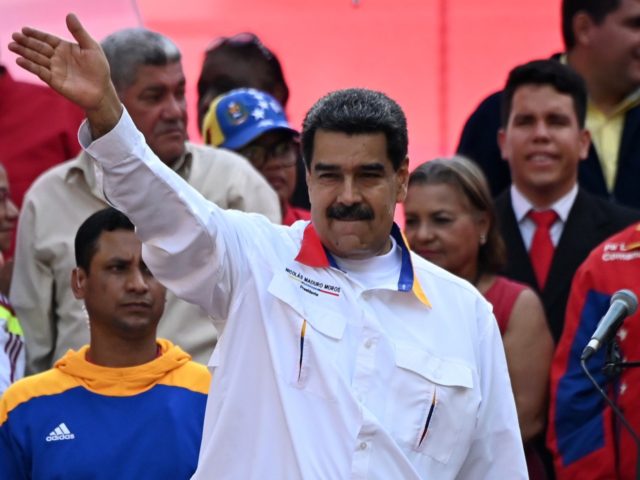Venezuelan dictator Nicolás Maduro announced on Thursday his regime would invest “immediately” into Chinese telecommunications giants Huawei and ZTE to bring a 4G wireless network to the country, which is suffering chronic shortages of food, medicine, electricity, and gasoline under his rule.
Maduro’s announcement, at an event with military leaders, appears to be a response to the government of the United States warning other countries not to do business with Huawei and passing an executive order that bans working with foreign corporations that compromise U.S. national security, a move believed to directly target Huawei. American security experts have accused Huawei of using its technology for Chinese government espionage, both for information that compromises America’s military security and to steal pivotal American intellectual property and technological development.
New investment from the Venezuelan regime into ZTE also follows reports that the corporation helped Maduro build the technological infrastructure for an elaborate authoritarian citizen monitoring network similar to China’s “social credit system,” which punishes dissidents by preventing them from traveling internationally or domestically.
“I have ordered immediate investment together with our Chinese brothers and China’s technology, the technology of Huawei, of ZTE, of all the Chinese corporations and all the Russian corporations so that we can elevate the capabilities of all the communications systems and make the 4G system a reality,” Maduro said late Thursday of state television.
Maduro also condemned the U.S. “aggression” towards Chinese telecommunications system, branding it another front in what he has long called an “economic war” against his own regime and other rogue states around the world through sanctions.
It remains unclear how Maduro, who is not legally the president of Venezuela, will pay for this investment. European banks where Venezuela has stored tons of gold reserves have frozen those assets and the United States has imposed sanctions on every senior member of the Maduro regime. The regime also has little ability to collect taxes in a country where inflation has surpassed 1 million percent. Researchers studying organized crime and opposition members claim, however, that Maduro and his henchmen enrich themselves through participation in transnational drug trafficking and cooperate with terrorist groups like Hezbollah and the Revolutionary Armed Forces of Colombia (FARC).
Maduro has used the funding and support of these groups, and especially senior members of the Venezuelan military, to stay in power after President Juan Guaidó was sworn into office in January. The National Assembly, the federal legislative body, appointed Guaidó interim president after a fraudulent election in May 2018 in which Maduro banned non-communist candidates and used violence to intimidate voters.
Huawei has struggled to convince the world this month to disregard actions by the Trump administration to curb its advance into U.S. markets. Security experts have warned for months that Huawei, owned by members of the Chinese Communist Party (CCP), was cooperating with the Chinese government to steal trade secrets and spy on Americans. President Donald Trump issued an executive order last week that essentially blocks American businesses from working with Huawei, resulting in Google withdrawing Huawei access to its Android network. Google temporarily relented, but the move has pushed Huawei to seek alternatives to stay in business.
Huawei CEO Ren Zhengfei said in an interview with Chinese media Tuesday that his company has long expected conflict with the United States and had been building alternative networks to use in the event that it lost access to U.S. technology corporations.
“The US 90-day temporary license does not have much impact on us, we are ready,” Ren said. “Huawei had made preparations for extreme situations even before the Chinese Lunar New Year [February].”
He added that Huawei was seeking to “stand at the top of the world … for this ideal, there will be conflict with the United States sooner or later.”
In Venezuela, Huawei’s corporate entity there attempted to ensure residents that systems would continue to function properly regardless of the outcome of tensions with the United States.
“Huawei will continue to provide security and service updates to all existing Huawei smart phone and tablet products, including those sold out and those still available,” Huawei Venezuela Communications and Public Relations Director Ángel F. Duque said in a statement Thursday. “Huawei products … will be able to be used with total normality and will not be affected” by tensions in America, he added.
Huawei has a strong presence in Latin America. In Ecuador, it helped establish a totalitarian surveillance system for socialist ex-President Rafael Correa in the last decade, installing cameras nationwide to monitor anti-socialist dissidents. ZTE executed a similar project in Venezuela through the “Fatherland Card,” a ration and identification card Venezuelans need for nearly every basic daily errand.
The Chinese government generally plays a key role in helping Maduro stay in power. China’s communist leaders “are single-handedly helping conduct the Internet control operation” in Venezuela, Senator Marco Rubio (R-FL) told Breitbart News in an interview this month. “They have basically taken a commercial version of their great Internet firewall and given it to Maduro, and it is a service they are providing him, so they are the ones that are shutting down the Internet and access to social media.”

COMMENTS
Please let us know if you're having issues with commenting.